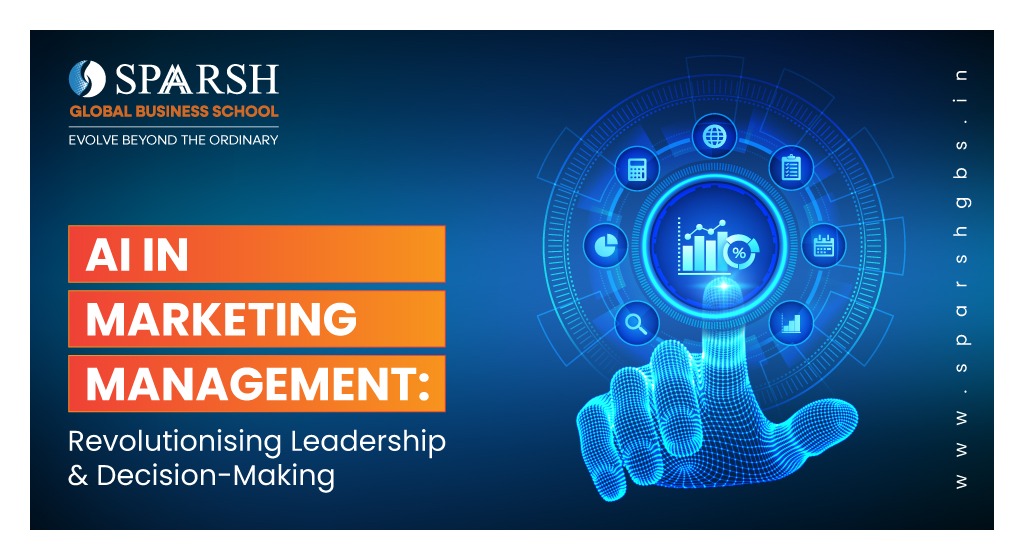Artificial intelligence (AI) has recently transformed from a mere technological novelty into a strategic business tool that organisations have used in their global practices. AI actively reshapes marketing management by transforming both leadership responsibilities and managerial decision-making. The analytical capabilities of AI enable marketing professionals to make wise choices swiftly and tailor solutions specifically for customers, thus reshaping organisational marketing methods and consumer relationships.

The Changing Face of Marketing Leadership
For ages, marketing leadership has functioned based on intuition, experience and reviewing historical data. Through AI tools, leaders can predict market movements, while developing personalised marketing offers, thus enhancing resource utilisation and maximising customer satisfaction.
Large datasets submitted to machine learning algorithms reveal hidden patterns that human observers cannot identify. The analysis of data prediction systems enables marketing heads to transform their business plans according to consumer demands and changing marketplace conditions. Thanks to AI technology, leaders can make quick, reliable decisions through actionable insights.
AI determines the proper development of organisational culture. Modern marketing leaders enable team-based experimental work to establish innovation cultures. In today’s business world, organisational leaders take the centre stage in digital transformation because agility combined with innovation is a vital competitive advantage.
Enhancing Decision-Making Through Data Intelligence
Marketing management at every level experiences transformative decision-making through AI-scale data processing abilities. AI systems now consume data from diverse authentications in real time, including social media sentiments, online browsing tracks, CRM databases and market research outcomes.
One of AI's most significant advantages in decision-making is its predictive capability. Through advanced analytics and modelling, AI can accurately forecast future consumer behaviours, market shifts and campaign outcomes. This enables marketers to act proactively rather than reactively, fine-tuning their strategies to stay ahead of the competition.
AI systems that segment customers enable marketers to create specific audience profiles for better marketing results through targeted communication approaches. Chatbots and recommendation engines powered by AI technology create personalised customer experiences that build loyalty and retention. The new technologies enhance business operations while creating better customer bonds, essential for achieving lasting commercial success.
Driving Innovation in Campaign Strategy
Artificial Intelligence technologies have transformed marketing campaigns by influencing design innovation and execution optimisation. Human marketers could only make creative decisions, but AI nowadays helps them by creating content and optimising advertisements and communications, alongside real-time A/B testing. Through Google Ads and Meta advertising platforms, AI systems currently help users decide on advertising budgets, select targeting options and present relevant content suggestions.
Natural Language Processing (NLP) technology helps brands analyse consumer discussion patterns through emotion detection while providing detailed assessments about brand reputation and customer satisfaction levels. AI systems monitor social media platforms to identify situations that could develop into major issues; hence marketing departments gain fast and calculated response capabilities.
Technological progress makes the launch and refinement process of marketing campaigns faster, while reducing the necessary resources. Increased marketing scalability and decreased risk enable businesses to explore new ideas while delivering relevant content in competitive market environments.
Ethical Considerations and the Human-AI Balance
The major benefits derived from AI marketing practices must stay within ethical boundaries of implementation. Marketing leaders need to focus carefully on data privacy together with understanding algorithmic bias and transparency issues. Data security ethics have become a priority for consumers; so businesses need ethical data management practices to uphold trust with their customers.
Marketers need to maintain the proper equilibrium that exists between automated systems and human subjective input. Human decision-making steps in as AI lacks emotional intelligence. Marketing leaders should achieve the right equilibrium by connecting AI with human choices while recognising AI as an enhancement tool for human decision-making.
Preparing Future Leaders for the AI Age
The future leadership development of marketing management relies heavily on business schools in their role of preparing future professionals. Business Education programmes need to undergo changes which insert content about AI competence alongside data sciences and ethical methods of technological application.
Sparsh Global Business School emphasises on technological integration into its academic programmes because it believes current students need essential skills for leading AI-based organisations. Sparsh Global Business School empowers students to understand the complete impact of AI on marketing, which produces a new generation of marketing leaders who can confidently and ethically manage an AI-driven future.
FAQ
- How is AI transforming the role of marketing leaders in today’s business environment?
AI is shifting the role of marketing leaders from intuition-based decision-makers to data-driven strategists. By leveraging AI tools such as predictive analytics and machine learning, leaders can anticipate market trends, personalise campaigns and optimise resource allocation in real time. This transformation encourages a culture of innovation and agility, empowering leaders to make faster, more informed decisions.



